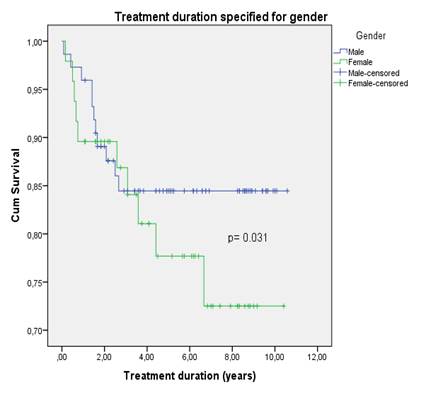Session Information
Session Type: ACR Poster Session B
Session Time: 9:00AM-11:00AM
Background/Purpose: Anti-TNF treatment is available for Ankylosing Spondylitis (AS) for many years now, but the data on long term follow up in daily practice are limited. To determine treatment survival and adverse events of anti-TNF treatment in AS patients in a large peripheral hospital in daily practice. Also, gender differences in drug survival and side effects were studied.
Methods: Retrospective data were collected from AS patients treated with etanercept, infliximab and adalimumab in the period of January 2004 until January 2014 in the Kennemer Gasthuis. Statistical analyses were performed with Kaplan Meijer survival curves to describe the drug survival and occurrence of adverse events in time.
Results: In total 122 ankylosing spondylitis patients were included with 159 treatment episodes (defined as time on drug) over a 10 year time period. The mean treatment duration was 51 months (range 1-127 months). Females showed a significant shorter treatment period compared to males (33.4 vs. 44.9 months) (Figure 1). Overall, 21% of the patients stopped the TNF alpha inhibitor after a mean period of 15 months, mainly due to inefficacy (53.7%). Only 6 patients stopped because of infections (mild) and no patients had malignancies. Female patients switched more often compared to male patients (26.9% vs. 16.3%). Females had a significantly higher risk (26%) at developing infections compared to males (19%).
Conclusion: Over a mean treatment period of 4.3 years (51 months), nearly 80% of the patients treated with anti-TNF treatment continued using these drugs. Females showed a significant shorter treatment period compared to males (33.4 vs. 44.9 months). The most important stop reason was inefficacy. Women developed significantly more often infections during anti-TNF treatment than men. 
To cite this abstract in AMA style:
Rusman T, ten Wolde S, Euser SM, van der Ploeg T, van Hall O, Van der Horst - Bruinsma IE. Gender Differences in Ankylosing Spondylitis Patients Treated with Anti-TNF in Daily Practice with Ten Year Follow up [abstract]. Arthritis Rheumatol. 2016; 68 (suppl 10). https://acrabstracts.org/abstract/gender-differences-in-ankylosing-spondylitis-patients-treated-with-anti-tnf-in-daily-practice-with-ten-year-follow-up/. Accessed .« Back to 2016 ACR/ARHP Annual Meeting
ACR Meeting Abstracts - https://acrabstracts.org/abstract/gender-differences-in-ankylosing-spondylitis-patients-treated-with-anti-tnf-in-daily-practice-with-ten-year-follow-up/
